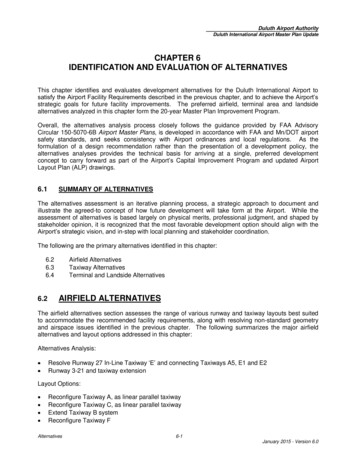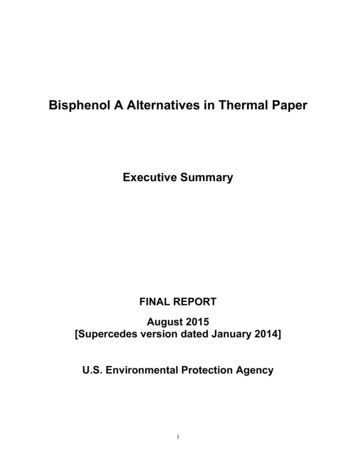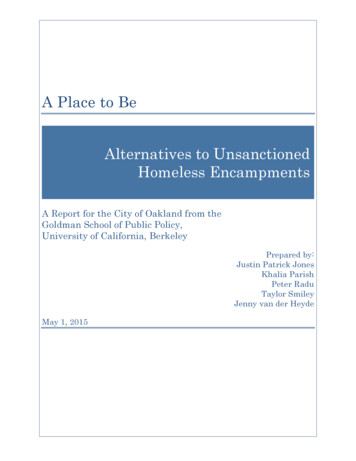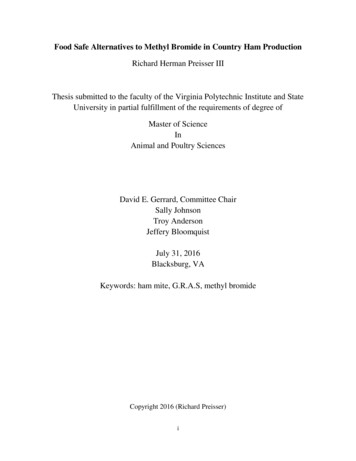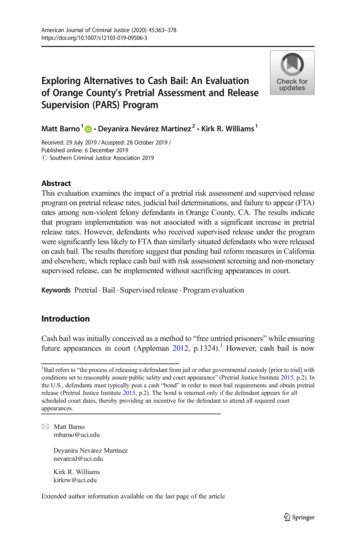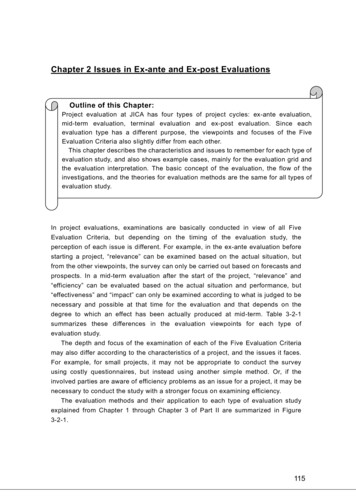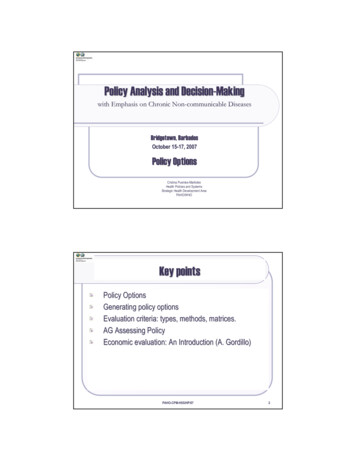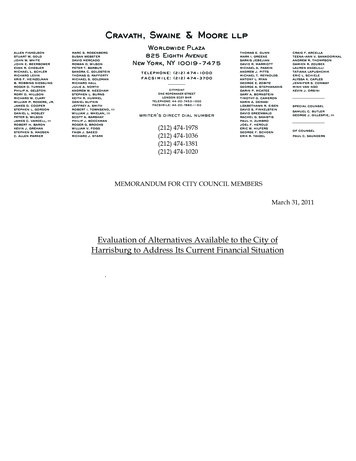
Transcription
(212) 474-1978(212) 474-1036(212) 474-1381(212) 474-1020MEMORANDUM FOR CITY COUNCIL MEMBERSMarch 31, 2011Evaluation of Alternatives Available to the City ofHarrisburg to Address Its Current Financial Situation.
TABLE OF CONTENTSI.EXECUTIVE SUMMARY . 1A.Background . 1B.Act 47 and Chapter 9 Procedures. 2C.Evaluating Alternatives. 6D.Negotiating Strategy Considerations . 12E.Conclusion. 15II.INTRODUCTION . 16III.BACKGROUND . 19A.Introduction to the Parties . 19B.Selected Relevant History . 21C.Outstanding Debt. 231.2.Harrisburg Direct General Obligation Debt . 24(a)Common Features . 25(b)General Obligation Refunding Bonds Series D of 1997 . 28(c)General Obligation Refunding Notes Series F of 1997. 29(d)General Obligation Notes Series A, B & C of 2003 . 30(e)Guaranteed Revenue Note Series of 2006 . 31(f)General Obligation Note of 2008. 32Guaranties of THA Facility-related Debt . 33(a)Common Features . 37(b)1998 Financing . 42(c)2002 Financing . 44(d)2003 Financing . 46(e)The 2003 Retrofit Project. 47i
IV.(f)Covanta. 53(g)The 2007 Retrofit Completion Project. 57D.Revenue and Assets . 59E.Collective Bargaining Agreements . 65F.Pending Litigation Against the City. 701.The County of Dauphin v. The Harrisburg Authority and City ofHarrisburg, 2011 CV 1618 (Pa. Super. Feb. 15, 2011) . 722.The County of Dauphin and Joseph and Jacalyn Lahr v. City ofHarrisburg, et al., No. 2009-CV-9271 (Pa. Super. July 22, 2009). 74(a)Summary of Suit . 74(b)Motion for Stay . 76(c)Possibility of Appeal . 773.The County of Dauphin and Joseph and Jacalyn Lahr v. City ofHarrisburg, et al., No. 1668 C.D. 2010. 794.TD Bank, N.A. v. Paul P. Wambach, Treasurer of the City ofHarrisburg, the City of Harrisburg, PA and The HarrisburgAuthority, 2010 CV 11738 (Pa. Super. Oct. 5, 2010) . 835.TD Bank, N.A., M&T and Assured Guaranty Municipal Corp. v.The Harrisburg Authority, the City of Harrisburg and Paul P.Wambach, Treasurer of the City of Harrisburg, 2010 CV 11737(Pa. Super. Sept. 13, 2010) . 886.Covanta Harrisburg, Inc. v. City of Harrisburg and Paul P.Wambach, 2010 CV 13120 (Pa. Super. Oct. 5, 2010) . 95DESCRIPTIONS OF ACT 47 AND CHAPTER 9. 96A.Act 47. 961.Basic Overview of Act 47 . 97(a)The Appointment of a Coordinator . 97(b)Act 47 Plan Contents. 98(c)Development of an Act 47 Plan . 99ii
2.3.B.C.(d)Implementation of the Act 47 Plan . 102(e)Termination of Distressed Status . 102Selected Precedent Act 47 Cases. 103(a)City of Reading . 103(b)City of Pittsburgh . 104(c)Westfall Township . 105(d)City of New Castle . 106Analysis of the Act 47 Option . 108(a)Comprehensive Review of the City . 108(b)Priority Consideration for Development Programs . 108(c)Grants and Loans. 108(d)Encourages Negotiation with Creditors. 110(e)Ability to Increase Tax Rates . 111(f)Prospective Collective Bargaining Agreements Limitations. 111(g)Timing. 112(h)Lack of Restructuring Tools. 115Certain Potential State Actions. 1151.State Takeover of the City. 1152.PICA. 116Chapter 9 . 1201.Chapter 9 of the Bankruptcy Code. 120(a)(b)Commencement of a Chapter 9 Case. 120(i)Eligibility . 120(ii)Governing Body Vote. 129Administration of a Chapter 9 Case . 129iii
(i)Role of the Judge . 129(ii)Role of State Law. 130(iii)Automatic Stay . 131(iv)Creditors’ Committee . 132(v)Creditors and Claims. 133(vi)Administrative Expenses . 138(vii) Contract Assumption and Rejection . 138(c)The Chapter 9 Plan. 143(i)Debtor’s Exclusive Right to File a Chapter 9 Plan. 144(ii)Treatment of Bonds in a Chapter 9 Case . 144(iii)Classification of Claims. 146(iv)Plan Requirements. 147(v)Solicitation of Acceptances of a Chapter 9 Plan . 148(vi)Requirements for Confirmation of a Chapter 9 Plan . 149(vii) Insured Debt and its Effect . 154(viii) Overview of the Priority Scheme. 1552.Interaction of Chapter 9 and Act 47 . 1563.Application of Chapter 9 to Harrisburg . 157(a)V.Drawbacks of Chapter 9 . 163(i)Expense. 163(ii)Time . 164(iii)Right of Others to Be Heard . 164(iv)Uncertainty . 164(v)Adverse Effect on Credit. 165ALTERNATIVES AVAILABLE TO HARRISBURG . 166iv
A.Maintain Status Quo/Continuation of Default. 166B.Financial Alternatives. 1691.VI.Generate Funding from Certain City Assets. 169(a)Transactions Involving THA or its Assets . 170(b)Transactions Involving the HPA or its Assets. 1762.Renegotiate Terms of Existing Obligations. 1793.Increase Revenues. 1804.Refunding/Refinancing of Outstanding Debt. 1825.Expense Reductions and Revenue Increases . 1846.Increasing City Taxes . 184CONCLUSION. 186VII. THA FACILITY-RELATED DEBT CHART . 188VIII. TIMELINE OF KEY ACT 47 EVENTS . 189IX.TIMELINE OF KEY BANKRUPTCY EVENTS. 192X.INDEX OF DEFINED TERMS. 195v
Evaluation of Alternatives Available to the City ofHarrisburg to Address Its Current Financial Situation1I.EXECUTIVE SUMMARYA. BackgroundHarrisburg’s principal financial problems can be grouped roughly intotwo categories: structural deficits, that is, ongoing budget strains resulting principallyfrom weakening tax and fee receipts coupled with mounting expenditures, and financialobligations arising from the City’s guaranties of THA Facility-related obligations in thetotal current principal amount of approximately 242 million. As a result of these twoprincipal financial problems, among others, the DCED declared Harrisburg a distressedcity under Act 47 on December 15, 2010.The Facility-related debt comprises a combination of bonds that THAissued to the public, a swap agreement and a note that it issued to Covanta. THA’sFacility-related bonds are revenue bonds, which are secured by and to be paid from thestream of income from the Facility. The City has guaranteed all THA Facility-relatedbonds. Assured has insured all THA Facility-related bonds, and the County has alsoguaranteed a significant portion of these bonds. If THA does not make a bond paymentwhen due, the City, the County (if applicable) or Assured is required to make thepayment. As between the City, the County and Assured, the City is primarily liable,We have not independently verified the completeness or accuracy of any of the informationprovided to us, including documents. At least in some cases, we received inconsistentinformation. The analysis in this Memorandum is based upon the facts as we understand them atthis time and as we have been able to determine to date. Nothing in this Memorandum shall beconstrued as an admission of any fact or legal position, and nothing shall preclude the City,including the City Council, based on additional factual information, legal analysis or otherwise,from taking a position in litigation, a chapter 9 case or otherwise that is inconsistent with any factstated or position taken in this Memorandum.1
2and the County is secondarily liable, so that the City is liable under its guarantee toreimburse any payments that the County or Assured makes.THA has not made all payments required on the bonds. The City has notmade all payments it was required to make under its guaranties, that is, the paymentsthat THA missed. Neither THA nor the City has replenished the debt service reservefunds for the bonds as required under the relevant indentures for the bonds. TheCounty and Assured have made all payments on the bonds that THA and the City havemissed to date, but have not made any payments to replenish debt service reserve funds.Assured, the County, various indenture trustees for the bonds andCovanta have sued the City. Among other remedies, they seek a “writ of mandamus”,which is an order requiring the City and its Treasurer to apply all tax proceeds first tothe repayment of the amounts the City owes under its Facility-related guaranties beforebeing utilized for any other purpose, including the City’s operating expenses.B. Act 47 and Chapter 9 ProceduresNeither Act 47 nor chapter 9 is a solution to Harrisburg’s financialdistress nor an alternative to addressing its underlying problems. Each is only a processby which a solution may be reached.They are not mutually exclusive processes.Rather, they are integrated processes that work together if a chapter 9 filing becomesnecessary. The goal is a solution to Harrisburg’s financial distress that will be embodiedin a plan, whether adopted under Act 47 alone or also under chapter 9, that provides indetail how the City will address its structural deficits and financial obligations.Act 47 and chapter 9 both contemplate a consensual plan, that is, one onwhich each of the major stakeholder groups agree. Achieving a consensual plan shouldbe a paramount goal of either process, because of the savings in time, expense and
3uncertainty that will result. However, an Act 47 plan can be implemented only if theplan is fully consensual, that is, if all stakeholders agree. By contrast, a chapter 9 plancan be approved by the court and made binding on dissenting creditors under certaincircumstances, as described in more detail below.Act 47 provides a city tools to use to create an Act 47 plan, such as theservices of management and economic consultants who can advise on operationalimprovements and on the economic and financial effect of changes that the Act 47 planmay propose; the centralization of plan negotiations; higher priority access to certainCommonwealth funds; access to a Commonwealth loan fund to meet operatingexpenses on a temporary basis; and the ability to raise taxes, with a court’s approval,above ordinarily applicable statutory limits.Chapter 9 provides protection fromcreditor collection actions; the ability to reject executory contracts; and the ability to binddissenting creditors to a chapter 9 plan that discharges a portion or all of their claims aslong as the court determines, among other things, that the city is doing all that canreasonably be expected under the circumstances to meet its obligations, whether thatinvolves raising taxes or fees, cutting expenditures or selling or otherwise monetizingproperty.Act 47 operates effectively only where all stakeholders agree on an Act 47plan, but the only sanction resulting from a failure to agree falls on the city, not on anyof the other stakeholders: the suspension of funding of all Commonwealth grants, loansand payments to the city (except for certain “pass-through” payments from the federalgovernment).Act 47 does not expressly stop litigation or debt collection activitiesagainst the city nor bind stakeholders to a solution that affects them, such as a partialdischarge of a claim or the resetting of a contract, to which they do not agree. Chapter 9
4permits a city to gain court approval of a nonconsensual chapter 9 plan and “cramdown” the chapter 9 plan on a dissenting class of creditors, but that approach is likely toinvolve significant litigation.Neither Act 47 nor a Harrisburg chapter 9 can affectTHA’s obligations on its Facility-related bonds nor the County’s obligations on itsguaranties. Nor, importantly, does chapter 9 operate simply to cleanse a city of its debt.Any discharge of debts comes only at an uncertain but likely significant cost.If it is not consensual, a chapter 9 case can hurt a city’s reputation forbusiness and in the credit markets, takes substantial time and attention away from therebuilding and growth needed to restore the city’s health and subjects it to the risk thatthe court may dismiss the case, leaving the city unprotected and without anymechanism to implement a payment plan.A non-consensual chapter 9 case hurtscreditors as well, by permitting the city to suspend payment of its obligations during thebankruptcy and by subjecting creditors to both the risk of losing—if the city proposesand the court approves a chapter 9 plan that substantially reduces the city’sobligations—and to the risk of winning—if the court does not approve the chapter 9plan and dismisses the case, leaving the creditors with competing mandamus actionsthat could destroy the city and no clear avenue to recovery. And the delay, uncertaintyand cost of litigation inherent in the bankruptcy process can hurt both the city and itscreditors.Act 47 and chapter 9 require the city council’s approval of an Act 47 planand of a chapter 9 plan. Neither the Coordinator nor the bankruptcy court can imposesolutions or a plan on the city. In addition, a chapter 9 court may not interfere with anyof the city’s political or governmental powers, including its use of property or itspayment of expenses. The court may not displace Commonwealth procedures, such as
5Act 47, that apply to Harrisburg. The Act 47 process continues during a chapter 9 case,and the Coordinator remains a central player in developing the chapter 9 plan.Therefore, the City should actively engage with its creditors and theCoordinator in serious negotiations to resolve its financial problems. If negotiationssucceed, a chapter 9 filing likely becomes unnecessary. But the City should not rule outthe possibility of a chapter 9 filing. That possibility and the power the filing can bring tobear on creditors may provide negotiating leverage that is not available where chapter 9has been ruled out as an option, for whatever reason. The possibility of a filing and ofthe automatic stay of litigation may also deter disruptive or debilitating creditorcollection action, such as continued pursuit of multiple mandamus proceedings thatcould starve the City of tax revenues, while negotiations are proceeding. There isanother reason to engage in good faith negotiations with creditors for a completeresolution of the City’s financial problems.Chapter 9 generally requires suchnegotiations as a precondition to filing for bankruptcy, although they may be excusedwhere a city reasonably believes that a creditor is attempting, through judicial action, toobtain payment ahead of other creditors (as may be the case here).The bondholders are protected by Assured’s insurance and the County’sguarantee (where applicable). Therefore, they are unlikely to engage in any sort ofrestructuring negotiations that would result in a reduction of the amounts owing tothem on the bonds. Instead, Assured and the County, as well as Covanta, will be theparties principally at risk from the City’s nonpayment of amounts owing under itsguaranties.
6C. Evaluating AlternativesThe City’s currently available cash resources are insufficient to meet itscurrently maturing obligations, especially those arising from the current and foreseeableshortfall of the Facility’s revenues to service the Facility-related debt. A solution to theCity’s financial distress requires bridging the gap between available cash and maturingobligations.It appears that no affordable or foreseeable amount of tax or feeenhancements or expenditure reductions alone would be adequate to enable Harrisburgto meet its Facility-related debt obligations. Therefore, some combination of operationalimprovements, budget adjustments, revenue enhancements, expenditure reductions(including potentially from contract renegotiations), asset sales or other forms of assetmonetizations, debt refinancings and debt reductions or other adjustments will likely berequired to achieve a solution.Making these elements come together to create a complete solution willrequire careful structuring. No single element appears to be adequate to bridge theentire gap. Nor is a piecemeal solution likely to succeed. A plan, whether under Act 47alone or under chapter 9 as well, should lay out all of the transactions and changes thatmake up the plan and, to the extent possible, provide for a substantially simultaneousclosing of any material transactions. The elements listed below should be evaluated aspossible pieces of a complete solution, which must be lined up in the weeks or monthsfollowing agreement on a plan and before final implementation. Elements of a solutionmight include: Long-term lease or concession agreement of the parking system or saleof the parking lots and garages. The HPA undertook an extensive bidprocess in 2007-08 and received a proposal from HPP for a 75-year lease
7in exchange for a payment of 215 million. HPP continues to express aninterest in pursuing the deal. A payment of at least 215 million could beused to retire or defease the HPA bonds and leave a substantial balance tothe City (subject to compliance with Commonwealth law for transfer offunds from the HPA to the City) for a payment of the approximately 65million currently owing on the Facility-related obligations.Anyremaining proceeds could be used to reduce amounts owing on theFacility-related debt as part of a complete refinancing of that debt.However, markets have changed dramatically since the tentative dealwas struck with HPP in early 2008 and a new bidding process for somecombination of lease, concession or sale might better test the currentmarket. The HPA should note, however, that there is no assurance thatHPP would participate or, if it did, that its offer would be on terms equalto or more favorable than those that are currently proposed. Nor is thereany assurance that other bidders would be interested or wouldparticipate, as there do not appear to have been any other publicexpressions of interest since 2008. Alternatively, improvements in parking system operations or increasesin parking rates. The parking system currently contributes revenue tothe City’s budget. HPP’s proposal for a long term lease of the parkingsystem suggests that revenue could be improved by the installation ofelectronic and other automatic collection equipment and by affordablerate increases. However, any such installation would require financing.Financing might be available from a concession agreement with a
8commercial parking operator, who would operate the system for a fee,perhaps including a revenue sharing arrangement or from a refinancingof the HPA bonds. The City does not directly control the HPA, so anyrevenue enhancements from the parking system or other transactioninvolving the parking system would require agreement from the HPAboard. Sale of THA Facility.The LCSWMA has delivered an unsolicitedproposal to THA to acquire the Facility for 45 million. The proposalaffirmatively states that the LCWSMA would not assume any of theoutstanding Facility-related debt of THA.The LCSWMA’s proposalcontemplates a dramatic reduction in tipping fees, but it has stated that itis open to a transaction involving alternative tipping fee rates for a higherpurchase price. Alternatively, operational improvements at the Facility; increases intipping fees; and improved enforcement of flow control. A study byR.W. Beck suggests renegotiation of the MPS with Covanta to providegreater certainty on certain matters and increased financial incentives toCovanta to improve operations and cash flow. The LCSWMA proposalalso highlights possible operational improvements. Facility operationalimprovements could increase THA’s ability to contribute to debt servicepayments on Facility-related debt, reducing the City’s guarantee burden.We understand that City tipping fees of 200/ton are substantially abovemarket and that County tipping fees of about 72/ton are also abovemarket, although less so. This provides an economic incentive for haulers
9to disregard flow control laws.THA is responsible for flow controlenforcement and, we are advised, has been addressing enforcementissues more aggressively recently. Any increase in tipping fees risksmaking flow control enforcement even more challenging. In addition,THA is under a contract with the County that sets County tipping fees.2However, the County is materially at risk in the absence of a solution tothe City’s financial problems (because of its secondary guaranty of muchof the Facility-related debt), so it should have an incentive to contribute toan overall solution through some increase in County tipping fees orotherwise, and could possibly offer greater assistance with the flowcontrol enforcement issue. Expense reductions through improved management of City functionsand revenue increases through enhanced collection activity for taxes,fees and fines. The Coordinator’s Act 47 Plan is likely to address thesematters as well as other tools to help the City operate more efficiently.However, the Coordinator’s analysis is not yet complete, and thesematters are beyond the scope of our engagement, so we do not commenton the contribution that these actions could make to bridging the gap. Wage and benefit reductions based on renegotiation of collectivebargaining agreements with the City’s unions.As with expensereductions generally, we are not in a position to comment on the valuethat might be available from a renegotiation of such contracts.2Note that a past attempt to increase them was unsuccessful.The
10Coordinator may comment on appropriate modifications to suchagreements.The unions and their members might be motivated torenegotiate based on their desire to restore the City’s financial soundnessand by the possibility of legal challenges to the extension of the currentterm of the contracts by the former Mayor and by the risk that thecontracts may be rejected, and new terms and conditions of employmentimposed, in a chapter 9 case. On the other hand, the City presumablywould not welcome labor unrest at this delicate time. Increases in various taxes or fees, including property taxes, earnedincome taxes on City residents, commuters or both, poured drink orother consumption taxes and parking taxes.Tax rate increases,however, do not always result in higher revenues, because higher taxescan result in increased tax defaults, in lower property values and in flightfrom the City, lowering total receipts.Balancing tax rates and thepopulation’s ability to pay them requires careful economic analysis that isbeyond the scope of our engagement but is likely within the scope of theCoordinator’s assignment. We recommend careful review of any suchanalysis that is included in the Coordinator’s report and Act 47 Plan. Increase PILOT (payment in lieu of taxes) payments. Over 45% of realproperty within the City is tax-exempt, including many Commonwealthbuildings. The Commonwealth does make some contributions to theCity’s expenses and nonprofit organizations within the City make somepayments. However, we do not have city-level data on PILOT paymentsto evaluate how they compare with the tax payments that would be made
11if those entities were not tax-exempt. It may be worth evaluating whetherPILOT negotiations with the Commonwealth or the imposition of someincreased payment obligation for nonprofit organizations could provideadditional budget relief. Refinancing some or all of the bonds for which the City is liable,including GO bonds and the Facility-related debt, for a lower amountbased on paydown from other sources and at a lower interest rate. Arefinancing based on a complete resolution of the City’s financialproblems might result in a lower overall interest rate, reducing debtservice obligations.However, there are limitations on refundingmunicipal bonds and preserving tax-exempt status. These would have tobe investigated carefully to ensure that the refinancing would provide thebenefit of lower rates. Seeking credit support or other contributions from Assured for anyrefinancing. Assured will likely oppose any effort by the City to obtain areduction in the
Harrisburg, the City of Harrisburg, PA and The Harrisburg Authority, 2010 CV 11738 (Pa. Super. Oct.5, 2010).83 5. TD Bank, N.A., M&T and Assured Guaranty Municipal Corp. v. . based on additional factual information, legal analysis or otherwise, from taking a position in litigation, a chapter9 case or otherwise that is inconsistent with .
